All members of Subud Greater Seattle are welcome to celebrate the birthday of Paul Nelson, Friday, September 22, 2023 from 6-9pm. It is a potluck and a BYOB and Paul turns 62.
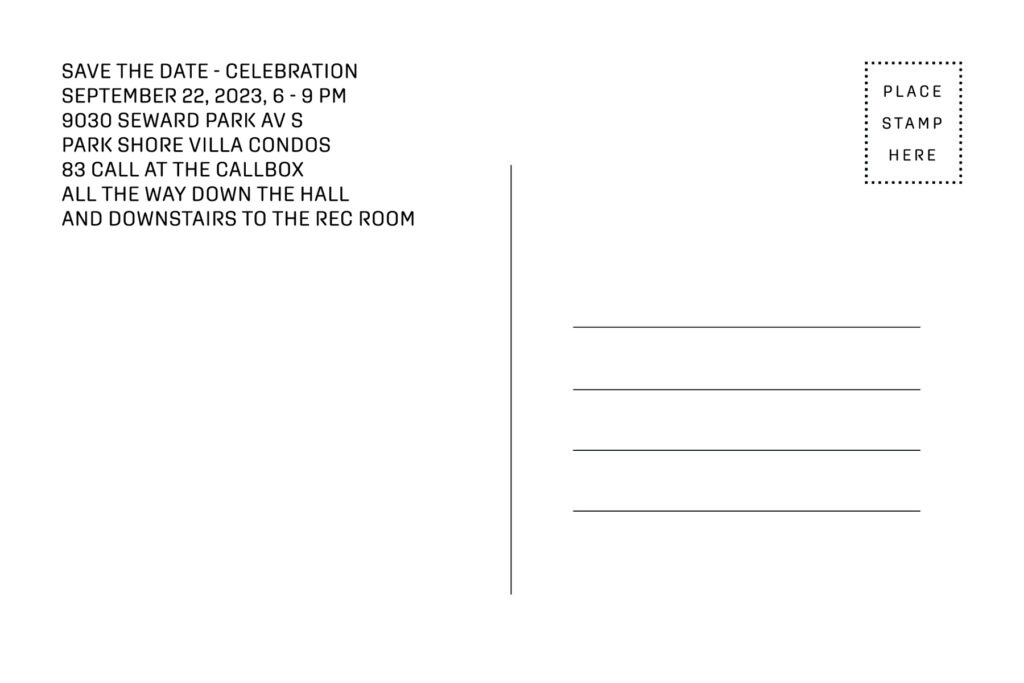
Paul Nelson 62nd birthday (back)

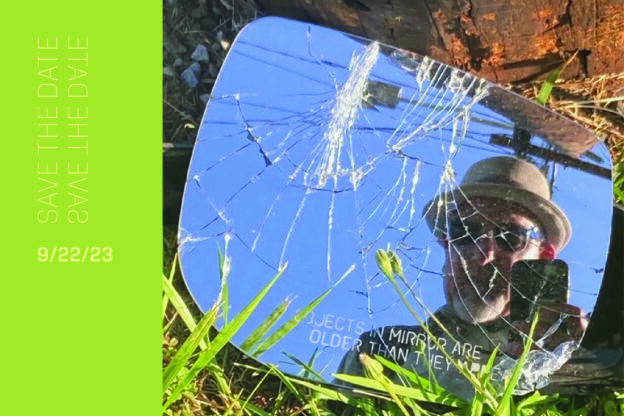
All members of Subud Greater Seattle are welcome to celebrate the birthday of Paul Nelson, Friday, September 22, 2023 from 6-9pm. It is a potluck and a BYOB and Paul turns 62.

Paul Nelson 62nd birthday (back)
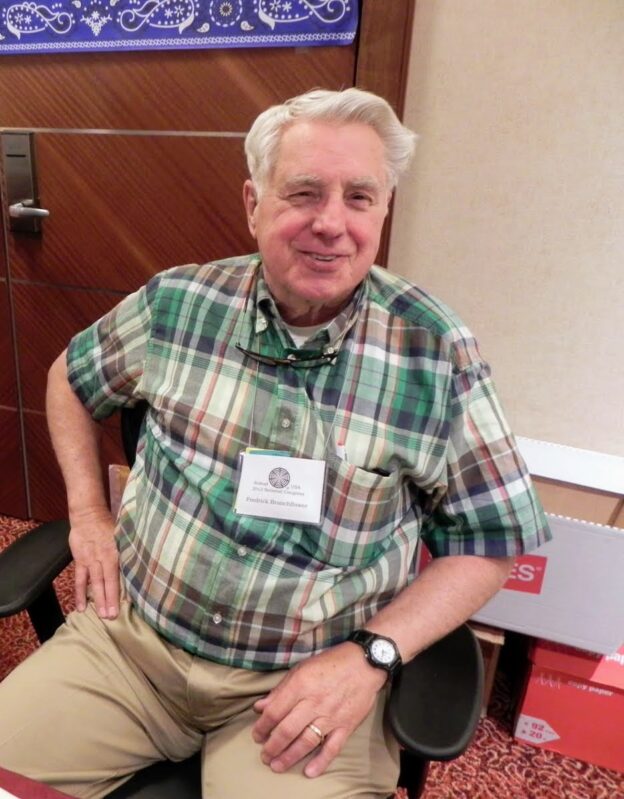
Fredrick passed away peacefully in his easy chair the morning of Monday, November 28, 2022. We learned this evening via Isabelle Gates (Fredrick and Melanie’s daughter). Such a devout Subud member who impacted so many lives in such a positive way. A relentless entrepreneur, he will be missed terribly.
Please enjoy this interview with Fredrick and Melanie from May 2015:
I had the good fortune to interview Frederick and Melanie Branchflower in February at their beautiful Poulsbo, Washington home. Chatting for an hour, they talked about their life as Subud members and I am presenting the audio and text here today. I have proofed the text of the first half of the interview, but will post all the audio here and what text has been reviewed. I am grateful to Elisha Gullixson, Bhakti Watts and Hadiyah Carlyle for their financial assistance with the transcription and of course the Branchflowers for their time, hospitality and dedication to our Subud community. The first half of the transcribed interview first appeared in the Subud USA newsletter.
A Life in Subud: The Branchflowers
We were invited by the Branchflowers, part of the Pacific Northwest’s Olympic Neighborhood Subud community, to stay overnight, enjoy breakfast waffles and talk about their life in Subud, at their lovely home in Poulsbo, Washington.
PN: First of all, thank you for the amazing hospitality and we’re very grateful for everything and dinner last night and the beautiful breakfast. Can you each tell me your — you’re both from Seattle. We’re looking at Seattle natives. Holy cow.
FB: Yeah, Melanie is.
MB: Right.
FB: Yeah, I’ve known Melanie for about 77 years, close to it. I was visiting with my parents when – after she was born. She was still in the hospital and my parents knew her parents, and I visited…
PN: You pick them out early.
FB: And we ran together as kind of a gang when we were in high school, and then I was back at Princeton and she went to Goucher and that’s when —
MB: We started dating.
FB: — we started dating and so we were married right after I graduated.
PN: And you grew up in the Mount Baker neighborhood of Seattle?
FB: Yeah, but we also had a place on Bainbridge Island up in the Manzanita Bay and so we knew each other real well during the – and there was probably twelve people in our group and there was nobody dating in the group but interestingly enough, out of that, I think there were three or four marriages. So that —
MB: We always called it a gang but I guess it has a different context nowadays.
FB: Yeah.
PN: You weren’t doing as much drive-by shooting back then?
MB: That was very limited. We didn’t know about those things.
PN: But yet, you grew up —
MB: We knew about liquor. (Laughter).
PN: And who doesn’t!?! And you grew up on Capitol Hill.
MB: Until I was about nine, eight or nine.
PN: Then moved to this side of the water.
MB: Yeah. So we were only two blocks from Volunteer Park and I had a lot of freedom in those days and young kids, I could go down to the drugstore on Broadway or to the candy store. They had a candy store nearby and play up at Volunteer Park and all the alleys in between. You know, it was really pretty neat to be so free.
FB: And I also grew up —
MB: To roam about so.
FB: — I would take the Number 10 bus from where we lived to the YMCA down on Fourth and Madison and, you know, I was six years old but I was taught to swim by Helene Madison, who was an Olympic swimmer from the Seattle area and so that was pretty neat.
Finding Subud
PN: Tell us how you found Subud. What was the occasion?
FB: Probably we – I should do that one.
PN: Okay.
FB: I was going through – I was in the Navy and I had a Master’s Degree in Operations Research Systems Analysis and I was working for the Submarine Tactical Development Group in New London, Connecticut, and I had an office not much bigger than this rug and in the office was a facing desk and two chairs and that was it. During that time, I was really going through a spiritual crisis. I read the Bible from cover to cover. I read about Hindu, Shintoism, Buddhism, Taoism, Judaism, everything I could get my hands on and but the guy that was the civilian that was working for me, it was a guy by the name of Livingston Dodson and he was the founder, one of the founders of Skymont and they had just left Skymont and he and Vida Dodson, and Vida was the National Helper at the time. And I happened to borrow a math book from Livingston. It was a tatty old book. I was looking for an algorithm and in the cover of the book, it said “John Dodson.” I thought it might have belonged to his father or something. I asked and he said no, it’s mine. I said well, this says John Dodson and your name is Livingston Dodson. Well, after three days of questioning, I finally found out a little bit about Subud and he handed me a book by —
MB: Livingston just reeled him in.
PN: He reeled him in. That’s right. He was playing hard to get.
MB: Yeah.
FB: Well, it was and I was very persistent and he gave me a book called A Reporter in Subud by Varinda Vittachi and I read that book and I knew right then and there that this is what I’d been looking for. And I also knew at that time that this was something I did – I could not sell to Melanie. She had to discover this for herself. So I started getting these books and leaving them around the house, reading them but leaving them around the house and I also started doing something which I’d never done before and that is go out in the evenings to listen to Livingston. And we were in that – this was at the end of ’72 and oh, around November or something, so we had this free month probation. I had decided that this was what I wanted and meanwhile, Melanie picked up on it and so she got a hold of Vida and —
MB: Well, I already knew because of some wives luncheons and I tried to sell her soap. We were into some pyramid scheme or we were selling soap.
PN: Amway? Was it Amway?
MB: No, it was Bestline but same – same idea. God, Vida was really nice about it.
PN: This is Vida Dodson?
MB: Yeah.
FB: Yeah.
MB: Yeah.
PN: So she’s – so you’re finding the books laying around the house and then —
MB: Yeah, I don’t think I read the books. I think I have this sort of vague memory of his sitting on the couch and he read me something one night, and all I remember is that something inside me sat up and said whoa, here’s something, you know. Pay attention to this or whatever and so I started going over to talk to Vida and we ended up getting opened at the same time.
FB: Same day. In fact, there was a group of Skymonters that were coming north for a concert up in Boston or something, and they came through and that was the day —
MB: Well, she invited people from around. There were some people from Hartford, from New York who came up and a lot of people we know today, Elisha Gullixson and his wife, Dalton or —
PN: Elisha’s late wife.
MB: Late wife, yes. Ruth and Melinda Pleshet, Melinda Wallis and her then husband. Who else was it? Dalton? Dalton Allen —
FB: I think it was Dalton.
MB: — and his sister, his sister, Heather, or daughter or something.
FB: Who just recently died. She was – died and —
MB: So a lot of the people that she introduced us to then, we ended up meeting in Seattle.
FB: Years later.
MB: Which is kind of funny. Subud I guess had been kind of a small world after a while.
A Hippie Cult
PN: And it’s interesting because many people in Subud today don’t want to be publicly identified as Subud members so there’s the feeling that it’s obscure or that some people think it’s a cult and yet, we’re talking 1972 and you’re a Navy guy and, you know, the Navy doesn’t always have the most liberal people in it and yet, you were open enough to be interested in something like Subud. Can you speak to how —
FB: Oh, yeah.
PN: — what was it about you that made something like Subud be able to speak to you?
FB: I don’t know. But I do know that a couple months later, we went to our first Subud Congress. I think it was a U.S. Congress at the George Washington Hotel in New York City and I walked in. Now, I was a very conservative Naval Officer. I had a degree from Princeton, a very straight type of person, okay? And I walked in there and I thought I had joined a hippie cult and I could not believe it, you know? And a guy by the name of Francis —
MB: Von Kahler?
FB: Francis von Kahler saw me and recognized what was going on and he grabbed me and we went into a room and he talked to me for about four or five hours and I came out of there and said to myself if I can become more human like that person is, I’m willing to give this organization thirty years, and I made a pledge to myself at that time that I was going to stay with it. There was just something about Francis that was unbelievable. I’d never seen that in another human being and that was my first time that I just totally dismissed what was going on around me and got out of the judgment mode and said there’s something here that’s really important to me.
PN: What was it about, what qualities do you remember that he had?
FB: I don’t know. I can’t put my finger and list boom, boom, boom, but he was one shoot —
MB: I think in the Navy, there wasn’t a lot of genuine – genuineness in people. You know, out there [were] a lot of shows, and officers, they had to act like they knew what they were doing, you know, it was somewhat judgmental. I don’t think anybody was really – women were more so less of a problem but the men, I don’t think you ever genuinely got to —
FB: Yeah.
MB: — how are you, you know, inside.
FB: And we went through – I grew up in the Presbyterian Church. Although, my mother was Catholic and my father didn’t attend church but there was a Presbyterian Church at the end of the block, and then when I got older, I went and studied under a Catholic and what have you. And I left the Catholic Church one day in Bainbridge that I’d gone to. The priest was up there lambasting this nudist colony that was on the island and said that nobody should associate with these people. I thought that was a little bit strange.
MB: Or their children?
FB: But then, he said and they’re children. Don’t have your children associate with these guys and I thought about that for about a half a second and I stood and gave them the reserve salute, turned right and that was the last time.
PN: What’s the reserve salute?
FB: Well, in other words, shove it. (Laughter).
PN: See ya.
FB: And so we eventually got married in the Episcopal Church and but we were not active church-goers. That doesn’t mean that I – I didn’t have these principles but I couldn’t connect with what was going on church-wise. But then when we got into Subud, I was connecting.
PN: You were connecting to spirituality or —
FB: Something was changing within me. I was starting to – I don’t know – discover myself much more.
Death of a Son
FB: And we had some experiences but I don’t think that the two of us would have survived as a couple when we lost our son in 1979 if it hadn’t have been for Subud. We were at a Congress in Toronto, a World Congress, and our son was out here on Bainbridge Island working for a I guess you’d call a lumber company or… and my parents lived on Bainbridge Island and that weekend, she would come and visit them and one Saturday morning, in August, he and my father decided they were going to bake some bread and they didn’t have the flour so he jumped in the car and went to get the flour and was T-boned with a truck and lost his life. But I don’t know. I’m not sure that Subud didn’t save our marriage so that was a very tough time for us and we left. By then, I’d retired from the Navy and we left, we were back in New London, Connecticut and we just decided to pack our goods and come to Seattle. We weren’t going to spend any more time in areas that we really didn’t love. So that had a profound effect on us and the Subud community really supported us in a really good way, spiritually and provided a comfort.
PN: Melanie, can you speak to how the community rallied in that instance?
MB: Well, we were at the Congress when we heard the news that he died and so we immediately – people came to do laithan with us and then we flew out to Seattle the next day. Our other children were all over the country. We had to gather them in, and because both our family was – lived on Bainbridge, we thought it was best to come out here so we did but the Dodsons who were still good friends of ours and lived near us, I guess we’d driven to the Congress with them, took us to the airport, got us signed up, you know, got us organized saw that we got our plane, and then a lot of really – really wonderful things happened. We ran into our daughter in the middle of O’Hare as we were going to our plane. She was coming from Connecticut and suddenly, I looked and there she was with her arms around Frederick, you know, and I got on the plane and I could – I had this experience of seeing our son. Darn it – he was happy. I saw his inner eye. He was sort of bouncing on the clouds. He was happy, you know, I couldn’t ask for more than that and then I remember sitting at the airport later in Seattle. I guess we were meeting one of our other kids and sitting there and I felt like I was at the Congress with Bapak in the front because he was at the Congress, I think. So there was a lot there that helped us. I think it was something that was supposed to happen. All my years growing up on Bainbridge, if I would – whenever I went over to Frederick’s family’s house and I would drive home, there were two streets and two roads and the second one was the one I was supposed to take but often I would think I got – where am I? I should be taking this one. Well, this first road was the one Bruce took and I think he thought he was going on the second one so he missed a stop sign that he should have seen but, you know, maybe he wasn’t paying attention either but little things like that had sort of told me, and I had some visions too before that didn’t mean anything to me but, you know, I’d see something in latihan like where he had been working. There was a lake and mountains around. It was a near an index and I saw that lake in my latihan which may or may not have meant anything but when we went up there later to see where he had been because we hadn’t been there before, it was this place that I’d seen in my vision. So I don’t know. I think that’s what – it was God’s will, whatever. I accept it as such.
Dealing With Grief
PN: You were married for so long and you were in Subud for so long that how has Subud helped sustain that?
MB: Well, I don’t know. I guess there’s just guidance. It’s something that you really put behind you after a while and he says it was hard on our marriage. You know, I don’t pretend we didn’t grieve and it was very hard to be there for each other because we were both really hurting, so we had a pretty awful year and we had three other children too and Isabel was a total wreck and it took her a long time to get over this, get past it. You don’t get over it. You get past it. She was very close to Bruce and they were almost a year apart.
FB: They were only eleven – fifty-one weeks apart.
MB: You know, and she really hated that she never got to say goodbye and all that stuff but I don’t know, just being able to do latihan. Time, you know, time helps and I remember some, maybe a year later, finally coming to a point where I said, okay, I’m either going to go off the deep end and stay there, or it’s time to just put it aside and move forward, and kind of that’s what we did, I think. But it kind of was a defining moment, just I knew that. And how I – how did I get through that year? I took courses at college. I took calculus and —
FB: Yeah.
MB: — I took a writing course, you know, it just took my mind off of me. I remember watching soap operas which I never did and stuff like that, and Vida. She was the only Subud member where we were living that first year and for some – somehow or other, she managed to convince me that her freezer didn’t work and could she borrow some space in ours because I have a big one in the garage, which of course, I said sure, you know. And she would turn up just at the right moment. I don’t know she did it but I’d be feeling awful or I remember one day, going through one of the drawers, it had been our son’s or something and that shattered me, and so she’d just show up and be this quiet presence and keep me.
(Doorbell rings)
PN: And there she is again. (Laughter.)
MB: Oh, yeah. Good for her.
PN: Maybe she has ice cream again.
FB: And we had some experiences but I don’t think that the two of us would have survived as a couple when we lost our son in 1979 if it hadn’t have been for Subud. We were at a Congress in Toronto, a World Congress, and our son was out here on Bainbridge Island working for a I guess you’d call a lumber company or… and my parents lived on Bainbridge Island and that weekend, she would come and visit them and one Saturday morning, in August, he and my father decided they were going to bake some bread and they didn’t have the flour so he jumped in the car and went to get the flour and was T-boned with a truck and lost his life. But I don’t know. I’m not sure that Subud didn’t save our marriage so that was a very tough time for us and we left. By then, I’d retired from the Navy and we left, we were back in New London, Connecticut and we just decided to pack our goods and come to Seattle. We weren’t going to spend any more time in areas that we really didn’t love. So that had a profound effect on us and the Subud community really supported us in a really good way, spiritually and provided a comfort.
PN: Melanie, can you speak to how the community rallied in that instance?
MB: Well, we were at the Congress when we heard the news that he died and so we immediately – people came to do laithan with us and then we flew out to Seattle the next day. Our other children were all over the country. We had to gather them in, and because both our family was – lived on Bainbridge, we thought it was best to come out here so we did but the Dodsons who were still good friends of ours and lived near us, I guess we’d driven to the Congress with them, took us to the airport, got us signed up, you know, got us organized saw that we got our plane, and then a lot of really – really wonderful things happened. We ran into our daughter in the middle of O’Hare as we were going to our plane. She was coming from Connecticut and suddenly, I looked and there she was with her arms around Frederick, you know, and I got on the plane and I could – I had this experience of seeing our son. Darn it – he was happy. I saw his inner eye. He was sort of bouncing on the clouds. He was happy, you know, I couldn’t ask for more than that and then I remember sitting at the airport later in Seattle. I guess we were meeting one of our other kids and sitting there and I felt like I was at the Congress with Bapak in the front because he was at the Congress, I think. So there was a lot there that helped us. I think it was something that was supposed to happen. All my years growing up on Bainbridge, if I would – whenever I went over to Frederick’s family’s house and I would drive home, there were two streets and two roads and the second one was the one I was supposed to take but often I would think I got – where am I? I should be taking this one. Well, this first road was the one Bruce took and I think he thought he was going on the second one so he missed a stop sign that he should have seen but, you know, maybe he wasn’t paying attention either but little things like that had sort of told me, and I had some visions too before that didn’t mean anything to me but, you know, I’d see something in latihan like where he had been working. There was a lake and mountains around. It was a near an index and I saw that lake in my latihan which may or may not have meant anything but when we went up there later to see where he had been because we hadn’t been there before, it was this place that I’d seen in my vision. So I don’t know. I think that’s what – it was God’s will, whatever. I accept it as such.
Led by Grace and Names
Fredrick: I have always felt throughout my life that I’m really not totally in control of what’s happening. Things happen. For instance, when I was in college, I was in pre-Med. I discovered between my junior and senior years that I passed out at the sight of blood. So this was really not the profession for me. I felt that I was becoming a doctor because my father was a doctor―that it really wasn’t me. I got into Marine Biology instead. We were married right after college and went back to Woods Hole, Massachusetts where we were semi working. We went to a friend of mine’s graduation at Officer Candidate School (OCS) and he told me all about it. I thought that the draft board was probably getting pretty close to me so the next morning I drove up to Boston with a hangover and enlisted. Two days later, I reported to Newport News, Virginia and two days after that, I got my draft notice from the Army. I did well enough at OCS that I got my choice of duty stations so I picked a submarine unit based at Pearl Harbor. That was wonderful. But unfortunately while we were over there, or, fortunately—I loved my Navy career—I got taken out on a submarine and just had a hell of a good time and loved it. I didn’t have any job to go to when I got out of the Navy so Melanie and I discussed whether we should try to go for— They had just changed the requirements that I didn’t need to be a qualified officer in order to apply for Sub school and I got in because I had recommendations from all these World War II submarine people. One thing led to another and I got into submarines and really found it extremely interesting. There’s a camaraderie―Submarine is not like most Navy which is based upon rank and what have you. In Submarine, it’s based upon qualifications and if you’re not qualified in Submarines, you’re nothing. I don’t care whether you’re a commander or what. There’s team work involved. How good a job that submarine does is based upon how everybody on that submarine works together and I really liked that aspect of it. But it wasn’t something I planned, I mean this was, boom, boom, boom—you know, accidental—going from boom to boom to…
Melanie: But it’s just that you had always tried to do your job, whatever you did—
Fredrick: Well, that might be… For instance, I got into Operations Research because I happened to be taking a cab one time in New York and I asked the cab driver what he was up to and he told me about Operations Research and when I had a chance in the Navy to apply for graduate school, I thought this would be a great area to get into. So, that got me into a whole different mindset. And then, when we got out of the Navy, I started into computers and I did some research back in Connecticut and then we moved out here. I eventually started my own firm with software development and consulting and, what have you, and this went on for 22 years. I worked on a project with Hanafi Fraval… But it has not been a plan, you know―boom, boom, boom—it’s been a circumstance…
Paul: Led by grace…
Fredrick: Yes, and I’ve kind of learned to just go with it and it’s been very interesting. And I have a lot of different names. My legal name is “Norman Francoise” and my Subud name is “Fredrick” and I’ve had a nickname of “Bud” and a nickname of “Twig Blossom.”
Paul: Can you say that again?
Fredrick: Twig Blossom.
Paul: Can you elaborate on that?
Fredrick: Well, if you look at Branchflower―
Melanie: I think I used to call you “Branch”…
Paul: I get it now, it’s from your last name.
Fredrick: I have been in an office working on a particular job and the secretary got five or six calls for me, each one under a different—
Melanie: [Laughter]
Fredrick: But the advantage is, if someone’s calling me, “Norman,” I pretty much know he’s an insurance agent—
Melanie and Paul: [Laughter]
Paul: Or from someone ringing the doorbell right in the middle of your interview…
Fredrick: Or, if someone said “Bud,” I’d know that they were from my early childhood. And I can kind of, just from by naming…
Paul: Victor Margolin says he has instead of time zones for his wife’s different names, he has “name zones” so he knows when to call her Shoshanah, and when to call her Sylvia.
Fredrick: Exactly, and it’s great in that respect. I don’t get hung up over names at all.
Becoming Melanie
Paul: You never took a Subud name?
Fredrick: Oh, yes. Melanie is her Subud name.
Paul: Oh, Melanie is a Subud name. Do you want to talk about how you took the Subud name?
Melanie: Well, it was fairly early, it might have been after four or five years in Subud, I forget when I changed it. It’s not that I had an urgent need to change it, but I was kind of curious to see because in those days we would write to Bapak and ask for a name and I think Bapak gave―well, he would send letters. He’d say, and I’m not sure if it was Bapak or Ibu Rahayu, I can’t remember now. They would send a letter and say your name should begin with “M” and then you would fill in five possibilities that you might like. I was kind of surprised about “Melanie”―essentially it means grace, I think―but I much prefer it to Nancy which is my legal name.
Fredrick: I choke when I start to call her Nancy, I really do, you know? I cannot―
Melanie: Well, it’s also hard because Fredrick’s brother’s wife’s name is Nancy, but his brother will not call me Melanie.
Fredrick: The interesting thing is my Mother could not buy into that at all and yet she grew up in a Catholic church and every time they get promoted they change their damn name and I told her, you know, that my name is Fredrick because when somebody calls me Fredrick, it puts me into a different space. But she never could understand that.
Melanie: My Dad did not understand that either.
Paul: You could have suggested that there are worse possibilities in Subud than Fredrick and Melanie, and I mean worse from a perspective of Anglo culture―that kind of thing. “Oh, you have a Muslim name… What kind of crazy thing is this?”
Melanie: Susilawati might have thrown them all right.
Paul: Susilawati Branchflower―that might have been a tough blossom to swallow.
Subud Olympic Neighborhood, Isolated Members, the Ingersoll Twins
Paul: Another thing is you are here in the Olympic neighborhood and there’s no Subud house here.
Fredrick: Well, that’s not a problem. We go from house to house so, in my part of the Subud group, the men, I’m the youngest, at 79, and we travel to each other’s houses on a rotating basis.
Paul: And pot roast is involved in these travels―
[Laughter…]
Fredrick: Only when we go north up to―
Paul: Chimacum.
Fredrick: Chimacum―
Melanie: Otherwise, it’s cookies and between a trip to Chimacum and―
Paul: Cookies, dessert and a pot roast. Sounds like a good diet!
Melanie: ―I purchase supplies from a bakery down here before the guys come for latihan―
Paul: So you wouldn’t call yourselves isolated members necessarily―
Fredrick: No.
Paul: ―because you’re doing latihan every week. So how did the Subud Olympic neighborhood community evolve?
Fredrick: Well, when we came over―we were here before the Ryan’s, I think―I guess we were kind of isolated at that point.
Melanie: Robert’s been here―Robert Knill―and I think Imbert also was here…
Fredrick: ―Imbert Matthee. He had his office for Clear Path International on Bainbridge and we would meet there and we did that for a couple of years.
Melanie: He actually bought a house on Bainbridge that he tried to use for―
Fredrick: ―the basement…
Melanie: ―the basement for latihan. The ladies (there were a couple of ladies here, too, that I was doing latihan with) tried to do latihan there in the basement and the one day that I remember, especially with one of the ladies who was pretty sensitive, the tenant upstairs was home and we could hear every sound he made and it just wasn’t comfortable doing latihan there so we didn’t go back. I don’t know what happened to the house. It was not in a very good area and so we just have been doing it up― Fredrick thinks it’s great to do latihan at our houses, but it means that I need to make sure that we kind of clean up a little bit before people come. So, that’s always a little more of an effort. It’s not a big effort, but it’s a little more effort to think about that before latihan instead of going to a place like―
Fredrick: We tried to get a Subud house in the Kingston area but we couldn’t work it.
Melanie: I know of a place right up here on the corner that would be perfect but I don’t want to have to fix it up and I’m sure we can’t afford it so, you know, it’s right up where people would see it and everything but―
Paul: So there’s a vision but when your youngest members are 79 and 77years old―
Melanie: It’s a little hard.
Paul: ―how much energy does one have?
Fredrick: Yes.
Paul: And that goes to the obligatory Subud question and that is, do you have concern about Subud’s future when in many communities the average age is 77 or 71 years old, or certainly, 60’s. You know I’m considered a younger member and I’m 53, you know?
Fredrick: Well, I’m not concerned with it because I think something will happen. I mean, my whole life has been based upon things happening without my controlling them―like a ping pong ball. Something happens and that causes something else to happen and I think the same way about Subud.
Paul: Well, the―
Fredrick: I’m certainly not going to keep Subud secret and if somebody asks me about it I will go for hours with them. But by the same token, I’m not sure that advertising, or whatever kind of promotion deal, is necessary.
Paul: So expect Subud to be slapped by the ping-pong paddle of Almighty God.
Frederick: Yes.
Paul: No, you said― Go ahead.
Melanie: Well, I don’t know―I think you have to be willing to hit that ball back once in a while. It’s partly being open, like I can see maybe there’s a place, maybe having some sense of―well, maybe somebody will come to it. Right now, I know I don’t have the energy to put an ad in the paper and say, “Can you all come?” but that’s work for some people, you know?
Paul: Well, this is very interesting that you say that because, you know, I’m a vision person, an idea person. I like to get things started and I also take it upon myself to be in the company of elders and I mean that in the most respectful way and, you know, when you say something like that, then maybe the seed is planted in me and maybe I relay it to someone who might be at a regional board meeting in the near future and might put that on as an agenda and see if that’s possible to do that and what will it take because, you know, we’re talking the Subud Seattle house just got a $10,000 grant from the Muhammad Subuh Foundation (MSF) to make it handicapped accessible and that’s a beautiful thing and that takes care of a lot of the cost of having that necessary act done. But, you know, it might be considerably less than we think to buy a house like this and who knows how this would affect the Subud community here? It might be a very good thing. I like to think that Subud has been an amazing thing in my own life and see the changes in it and continued changes in it and the ability to use it in times of need like when my father died, doing special latihans in Seattle the very day I found out he died, the very day he died, to do it in Evanston, Illinois, close to where he lived his whole life, and to do it again in Pittsburgh at the National Congress. So, maybe that’s something that can be taken up with the Subud Pacific Northwest Regional Dewan. So but you also have the experience of being actual isolated members. Can you speak to that?
Fredrick: Well, the most isolated, of course, is when I go on a 70-day submarine patrol and that is very isolating and―
Melanie: Were you in Subud then?
Fredrick: No, I guess I wasn’t then, but I did take― Oh, I know, on Point Loma when I was commanding officer and we were gone for four or five months, I think―
Melanie: Seven months―
Fredrick: Was it? In a different ocean― Melanie and the family were in San Diego and that’s where our ship was home ported. But I was operating in the Atlantic and I was the commanding officer of a Deep Oceanographic Research ship. We explored the ocean bottom down to 30,000 feet. I was the only Subud member on the ship and would do latihan in my stateroom. It would have been very helpful to have had a Subud group somewhere and the places where we went, there weren’t any groups. So that’s when I was most isolated, I would say.
Melanie: We were fairly isolated when we were in Connecticut after Bruce died. The Dodson’s were there which was wonderful. But I don’t think there was anyone else.
Fredrick: No.
Melanie: There were a few members in Connecticut and so occasionally we would get together with, you know, a larger group but―
Fredrick: I think that we had about 9 in our group at the most. We could have called ourselves―
Melanie: Subud Mystic.
Fredrick: ―Subud Mystic, but we didn’t―
Paul: Be careful…
Fredrick: ―because one of our members was from Mystic, Connecticut.
Melanie: There were some wonderful ladies and I’m not sure if we went there when we were living there, but let’s see if I can remember their names. They really did the―
Fredrick: Mary was one of them.
Melanie: Mary Mulhausen and― Oh, shoot!
Fredrick: They lived in a house down in Connecticut.
Melanie: Yes, these were two widows who probably were fairly wealthy but they built, or bought a house and they each had one end of the house as their personal quarters and then they shared a living room and kitchen. Elmira―
Fredrick: They lived to be in their 100’s.
Melanie: ―Elmira Ingersoll was the other lady’s name.
Paul: That’s Elmira…
Melanie: Ingersoll. And―
Paul: Where was this?
Fredrick: In Connecticut.
Melanie: It was in Connecticut. I’m not sure what the name of the town was.
Fredrick: Yes.
Melanie: It’s a little south of New London. I would go back― After we’d moved out here, I’d go back occasionally and visit Vita who lived in Waterford and we would go down and do latihan with Mary and Elmira. The last time I remember going there, they were both about 100 years old then―they’ve both since passed away― I walked into the living room, these two women were sitting getting quiet, and I could just feel this strength and it was really something―I don’t know if you ever met them―but I think it was just the four of us and I’m not sure, Fredrick, if you were along.
Fredrick: I was doing latihan on the other end―
Melanie: You were there one of the times. Yes.
Fredrick: ―at the other end of the house.
Melanie: But I mean these women could hardly get out of their chairs but, wow, they were really something! Afterwards we had tea and I can remember Mary pouring from a big pot of tea, this little lady who’s about 100 years old. She did it and she signed her book for us that night, too. But it was a treat. Elmira was into everything under the sun. She had all kinds of various spiritual groups and stuff going. But she had a lot of energy up until the end when she really couldn’t do very much. It was very much of a treat to visit those two.
Thoughts on Death
Paul: There was an older Subud member in Seattle who passed away and I was mentioning it to a brother during the beginning of quiet time, and he kind of shrugged his shoulders and I said, why that reaction? He’s like, well, this person was in Subud a long time so they know how to surrender and death is just one more surrender. Has your experience with Subud, and maybe your experience with your son, given you more of an acceptance of death or changed your attitude toward it?
Fredrick: Yes, I totally accept death. That’s not something I fear. I do fear physical―
Melanie: The physical process―
Fredrick: ―physical injuries, especially mental. But I don’t fear death itself at all.
Paul: You fear the potential of dementia or something like that?
Fredrick: Yes, and I work every day― I do Lumosity, which is an exercise that was developed by MIT and Stanford. It probably takes about fifteen minutes a day. There are different games or puzzles that you’re working on and the exercises involve speed and a lot of mental effort. I do that every day and I have for about a year and a half, two years.
Paul: Is there a history in your family of dementia?
Fredrick: No, but that doesn’t mean anything. But to go back to what you’re talking about― it’s an interesting thing. I’ve run into three or four different Subud members, who at one time or another, I disliked immensely. Not just sort of disliked, I really disliked. And it was interesting that by the time they were ready to pass away, they were best friends, really, and I would go over and be with them. We had one guy in the Seattle house that at one time I just really couldn’t stand him and I told him that, you know, and we― it was very interesting. It was a beautiful process, but it was― I was amazed at how my attitude had changed. It wasn’t a feeling sorry for the person. It was totally different. I don’t know whether he transformed or I transformed― but whatever it was, we were on a totally different―
Paul: ―wavelength.
Fredrick: ―connection. Yes, totally different. And that happened a couple times, not just an isolated one.
Melanie: I don’t know, I forget what the question was.
Paul: Your attitude towards death and Subud’s effect on how you perceive this, or your experience with Subud and how that maybe that has helped you prepare for that, or look at it in a different way?
Melanie: Well, maybe. It’s hard to say, you know, over 40-something years. I think we change anyway so how much that effects it. My mother had died before we even joined Subud and was fairly young so I’d faced it in the family before. It wasn’t like it was totally new. I think I probably do fear it less, probably feel like I should fear my life more, that I’m not living my life correctly more often. But I’ve seen friends pass and I’ve known friends pass and I’m always really happy when they seem to go smoothly. I’m not always happy to lose them but, I don’t know. That’s very hard to say whether my attitude has changed just because of Subud. I feel we just go on. I don’t have a sense that it’s the end.
Their Kids in Subud
Paul: You have several children and none of them are particularly active in Subud would you say?
Fredrick: Oh, I’d say a couple of them are.
Paul: Oh, are they?
Melanie: I don’t think they’re active. Actually, three out of the four have been opened. Isabel―
Fredrick: ―is not active.
Melanie: No, but she was opened when she was 18. I think it was after her brother died by Vita and myself. So it was two old mothers, you know, in her eyes, forcing her. I don’t think we did but, you know, I think that put her off. She has done latihan off and on. She’s been at Menucha. She’s always glad when she does latihan, but she just doesn’t do it herself. But she’s very aware and she looks inward and something’s working in her.
Paul: Did anyone tell her there was pot roast at the latihan?
Melanie: I never thought of that.
Fredrick: The pot roast isn’t in this place. We got to go up to Chimacum to get it.
Paul: I know. I missed it.
Melanie: That’s a guy thing.
Paul: Oh, it’s a guy thing.
Fredrick: Yes.
Paul: I see. Well, cookies then could be a draw. And your other kids there?
Fredrick: Okay. The youngest, I’d say, probably does the latihan the most.
Melanie: Well, she was born into the latihan.
Fredrick: Yes.
Melanie: We were already opened when she was conceived.
Fredrick: And when Melanie was pregnant with her and during the early years, she was in a very different environment, very quiet, the environment, than the others, and―
Melanie: I don’t think being opened was a very big deal to her.
Fredrick: No, it was almost natural. Steven loved to do the latihan, but he’s isolated and when he gets a chance, he’s more than happy to do it. He’s in Vermont.
Melanie: Steven was one who I think when he was about 20, I remember asking him if he had any interest and he said no, not now, but I’ll know when I do, and actually he did.
Fredrick: Yes.
Melanie: He was about 25, I think, when he was opened and he did latihan at the Subud house for a while when he lived here.
Fredrick: Yes.
Melanie: I think he put one of the layers of the roof on the Subud house.
Paul: We may be giving him a call in the near future.
Fredrick: He is an architect.
Paul: And then there’s one other―
Fredrick: Jenny, and she’s never been interested. She lives down in Incline Village in Nevada north of Lake Tahoe.
Melanie: Although, I think, intuitively we’re closer than the other kids.
Fredrick: Yes.
Melanie: ―At least, I am. So there’s something there intuitively, but they don’t acknowledge it.
French Fries, Worm Ranches, and Subud Failed Enterprises
Paul: What about speaking to someone who is a Subud person, who wants to know, who loves Subud, loves the latihan, knows what it’s done in their life and would like to see other people have this gift and knows that the culture is not proselytizing so they’re not going to go out passing out pamphlets or door to door, as we saw them produce it earlier today―
Melanie: Maybe we should do that.
Paul: How do you see Subud getting out there?
Fredrick: By people recognizing something within you― that they, is important. I saw that with Francis von Kahler. That this was something that you just didn’t preach to a person. This is something that came in a different way.
Paul: Exemplified.
Fredrick: Yes.
Paul: Yes.
Melanie: Exemplified. That’s absolutely it. And you see it in Susila Dharma projects, you see it in SICA projects, maybe even some enterprises. I don’t know whether it―
Fredrick: Well, look at your renting, people coming into the Subud house.
Paul: For the poetry festival―
Fredrick: And all of a sudden, they feel something different. They don’t know what it is and at this point in time, we need people to tell them what it is but, you know, or―
Melanie: They keep brochures at the Subud house?
Fredrick: ―be available for telling them.
Paul: Oh, yes, we have two brochures: one for the business, the centerprise, i.e., the Spring Street Center, and one for Subud. And every time somebody looks at the house―like I showed the Seattle house on Thursday and I said, “And here’s a brochure for the House, and this is a little bit about the group that you’re getting involved with.” I give the brochures to them and I don’t say anything. What they do with it is their business, you know.
Fredrick: Yes.
Paul: I’m just really grateful to be able to talk to you on this level, to be able to stay in your home and, you know, to hear the Subud stories of the times before I was involved in Subud. These are really beautiful stories and really important and I’m very grateful for having this experience.
Fredrick: We’ve had some wonderful Subud experiences.
Melanie: Sometime, I’ll see if I can find―there’s an article that Livingston wrote. He visited us when we lived in Scotland for a couple of years. He came up to visit us. He’d gone over to England to a Subud conference of some sort and there’s a story of when I drove him to the airport in Scotland and had car trouble. We were driving―we had a little bit of time and we went over to see the Bridge of Brigadoon and an air show and the gears got stuck or something when we were on the bridge. So somehow we got turned around and he held onto the gear stick while I was able to drive. He could write that story, did a beautiful job of writing the story. It was so funny. This was the second day we’d gone to the airport. The first day we missed the flight, he missed his plane. He was something else again.
Fredrick: He’s the only person I’ve ever met that can leave his lights on at night. He had very strange working hours, very strange. He would come at 4:00 in the afternoon and leave at oh, 7:00 or 8:00 in the morning, leave his lights on, burn his battery down, get his wife to come on in, to change cars―they would jump them―and leave her lights on and burn up in one night. Livingston and I had a lot of projects together: we had a worm farm, which was a very interesting thing. We had―oh, just a bunch of―
Melanie: I think one of the funniest evenings was to listen to Fredrick and Livingston trying to fill out their taxes for this worm farm.
Paul: And your position? Worm rancher.
Fredrick: It was. It was nothing but―
Paul: You need very, very tiny whips to get them―
Fredrick: We’ve been involved in all kinds of failed Subud enterprises. [Something there.??]
Paul: Oh, I don’t think we have time for failed Subud enterprises. But can you mention one or two?
Fredrick: There was one in Scotland, for instance, we got involved with basically organic vegetables or something.
Melanie: That’s it.
Fredrick: I remember potatoes―
Melanie: It was a potato enterprise, french fried potatoes. They had some factory that would cut the potatoes―I forget what it was exactly.
Fredrick: But it was really quite neat and then suddenly it went south in a hurry. And, of course, we were involved with Anugraha and―
Melanie: Well, we invested in Anugraha and PT S.Widjojo―
Fredrick: ―and the gold that―
Melanie: ―and Kalimantan gold which we gave our shares away and now it’s doing well but at least, it went―we had a few shares we gave to the Muhammad Subuh Foundation.
Fredrick: And we were involved in the Subud Bank and the building in Jakarta―
Melanie: ―the Widjojo building, Widjojo.
Paul: Well, I’d love to hear about Subud enterprises, but I think it really is a can of worms, so we should―
Melanie: Well, I think you’re all looking in hindsight; we never invested more than we could afford, for one thing, which some people did and that was the hard part. We invested what we could afford to lose because we knew these were all start-up kinds of things. I mean, it wasn’t always easy but, you know, it didn’t pauperize us to lose that money and I think it’s all been a learning process and as an association somehow―
Fredrick: I haven’t felt very negative.
Melanie: ―I think we’re learning. It’s all these little parts that are having difficult times but gradually we’ll get it together. I’m not sure we’ve ever fully understood what Bapak meant by an enterprise. I mean, he would talk about it, starting an enterprise that would help pay for our Subud work and, to some extent, that’s beginning to happen in Seattle, but I don’t see it happening nationwide. I mean it’s really hard to conceive of.
Paul: Well, we’ll scratch french fries and worm ranch off the list and then just―
Melanie: Keep going.
Paul: ―keep going.
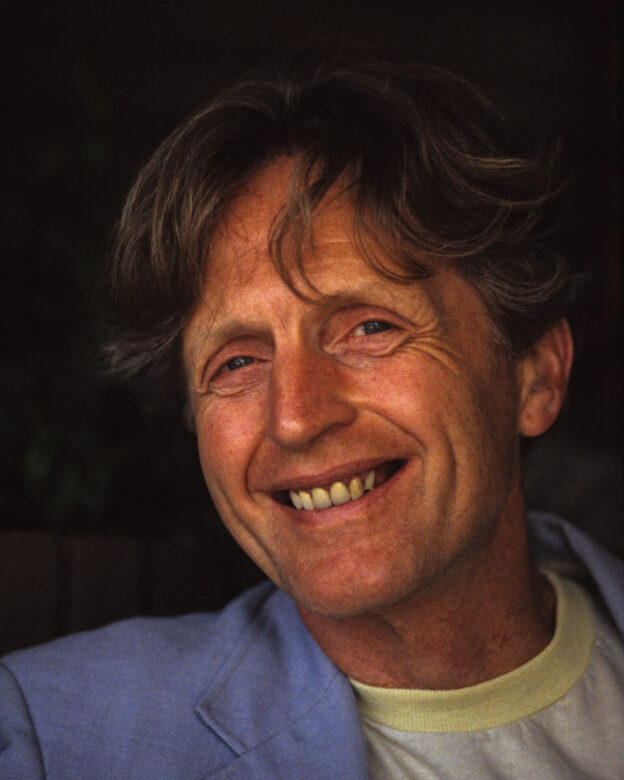
Halstein Stralberg passed away peacefully on Sunday November 6th, 2022 in Seattle, Washington due to heart failure.
Halstein was born to Sigurd and Randi Strålberg with the given name Arne on May 12th, 1939, on a farm near the town of Farsund in southern Norway. His early years were marked by the German occupation of Norway during World War II, with his parents actively participating in the resistance movement. He was the oldest of four children (brother Sverre and sisters Ragnhild and Inger). Due in part to their isolation, Arne spent much of his early childhood playing alone and developed a life-long streak of independence and self-reliance. He loved the outdoors and could spend hours by himself walking or skiing in the forests and mountains.
Halstein (then Arne) was a precocious child who excelled in school, especially in math and science. As a teen, he experienced himself as “different” from his peers and began searching for a spiritual path that would help to “fix” what was wrong with him. While studying mathematics at the University in Oslo, he heard about a new spiritual movement called Subud that was starting to spread from its beginnings in Indonesia to the western world. With very little money he made the trip to England in 1958 to be “opened” in Subud, at the age of 18. The profound experiences he received in Subud would shape the rest of his life. He was given the name Halstein by the founder of Subud, known as Bapak (“father” in Indonesian).
After finishing an undergraduate degree in Math, Physics, and Astronomy, Halstein obtained a Master’s degree in Mathematics. Soon after, he got a job with Norsk Hydro, a large Norwegian energy company, where he developed computer programs to improve aluminum production operations. He soon became well regarded for his ability to understand business problems and develop analytical models that would lead to better decision-making or improved processes.
In Subud, Halstein was an early “helper” in the Oslo group. He was known for his ability to get along with most people, being impartial in helping to solve conflicts and giving objective advice to members. Halstein met his wife, Ida, in Subud. They were married in 1964 and became a lifelong team, their marriage lasting 58 years. The Subud experience guided them to move from Norway to Los Angeles, California in 1968. Halstein felt that, despite his promising career at Norsk Hydro, moving to California would allow him more freedom to be his true self.
After moving to Los Angeles, Halstein and Ida eventually settled in the Sunset Park neighborhood of Santa Monica, where they lived for 45 years and raised four children (Diana, Daniel, Sylvia, and Adriana). While Ida took care of the house and children, Halstein found work at a small consulting company called Universal Analytics, where he worked from 1970 to 1999. He worked for another 20 years after that as an independent consultant specializing in mail sorting operations, leading him to work up until his 80th birthday. He was well regarded in his field and eventually became a trusted expert witness in large postal rate case proceedings.
Although his home was his sanctuary, Halstein also transferred his love of the outdoors to southern California and spent much of his free time hiking in the Santa Monica Mountains, walking on Santa Monica beach, and cycling and running long distances around town. He competed in many 10K runs, became a health nut, and tended a backyard vegetable garden. He was fortunate to be healthy and mobile for the great majority of his life. In 2013, Halstein and Ida moved to a new home overlooking Lake Washington in Lake Forest Park, Washington, to be closer to two of their children and six grandchildren. There he continued his habit of long daily walks as long as his health permitted.
Halstein’s professional achievements notwithstanding, most would say that he made his biggest mark on the world as a Helper in Subud. He held local, regional, national, and international positions multiple times each, and as a result traveled extensively in Latin America and got to know many Subud members around the world. Possessing a good ear for languages, he taught himself Spanish in order to connect more meaningfully with Spanish-speaking Subud members, and he took any opportunity to practice his Spanish with friends and strangers alike. His spiritual presence, keen sense of humor, and big smile will be greatly missed.
Halstein is survived by his wife, Ida, four children (Diana, Daniel, Sylvia, and Adriana), and eight grandchildren (Simone, Emily, Charlotte, Layelle, Dale, Iris, Rozaria, and Maeve). He also leaves behind a brother, Sverre, two sisters, Ragnhild and Inger, and a large extended family from the Strålberg and Birkeland families in Norway.
A Memorial Service for Halstein will be held at the Seattle Subud House (Spring Street Center), located at 1101 15th Ave, on Sunday January 22, 2023 starting at 1pm.
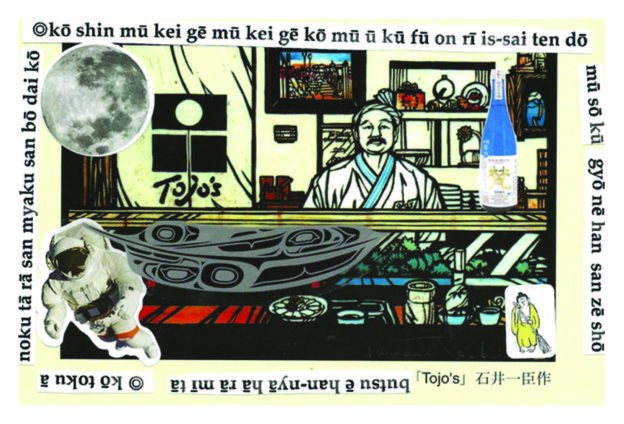
2022 marks Year 16 of the Poetry Postcard Fest & the fest is being supported for the 3rd year in a row by SICA-USA. There are several Subud members who are participating. and there are three slots left for this year’s fest which ends August 31.
Roberta Hoffman created the logo and the festival website:
Some participant testimonials:
As much as I love writing poetry, what I love about participating is the connections I made (though brief) when I receive a postcard in my mailbox. It makes me remember that we are all one and gives me a glimpse into lives of people I may never meet in person but I have “seen” them…their creative spirit, their emotions, their love. Poetry postcards are a reminder to open my heart.
The Poetry Postcard Fest is both community and practice. This simple medium gives each of us an opportunity to find and share our own voice. Since I first participated, in 2011, writing a short, unprompted poem each day has evolved from a one-month-a-year activity to a daily habit. During that time, I’ve exchanged postcards with hundreds of people, actually met a few in person, and enlarged my poetry network far beyond the local. The connections are vital and I often find myself surprised to remember that I’ve not actually met most of these wonderful poets and artists.
Neal Lemery
The project ramped up my writing, and my appreciation for the “daily write” discipline. What a celebration of the art of poetry and writing! I received such great and inspiring poems from strangers who became colleagues and fellow artists.
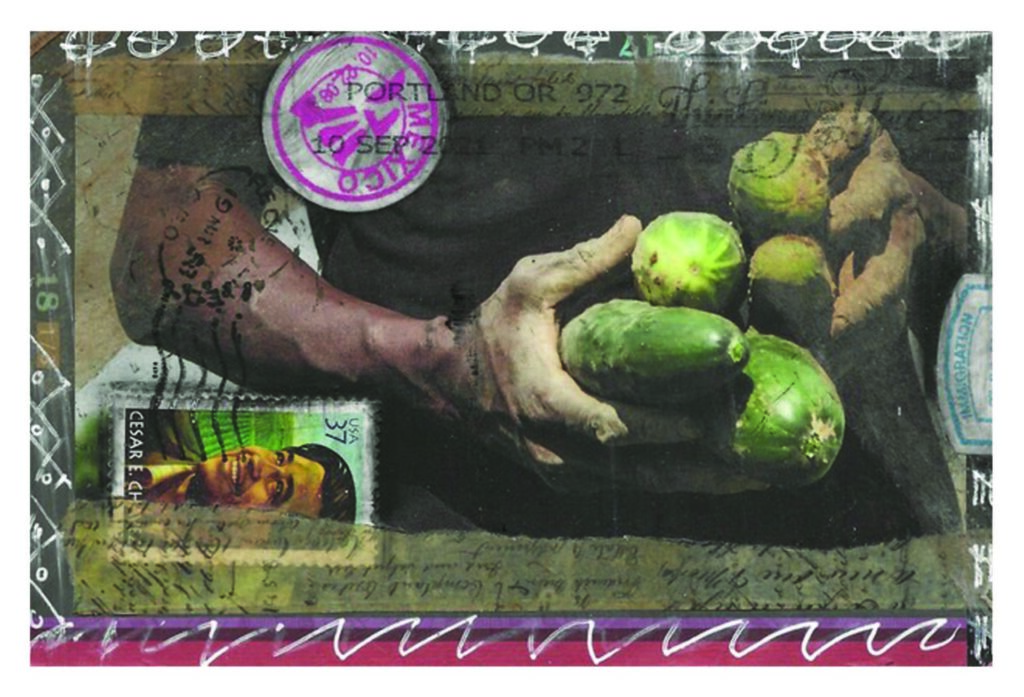
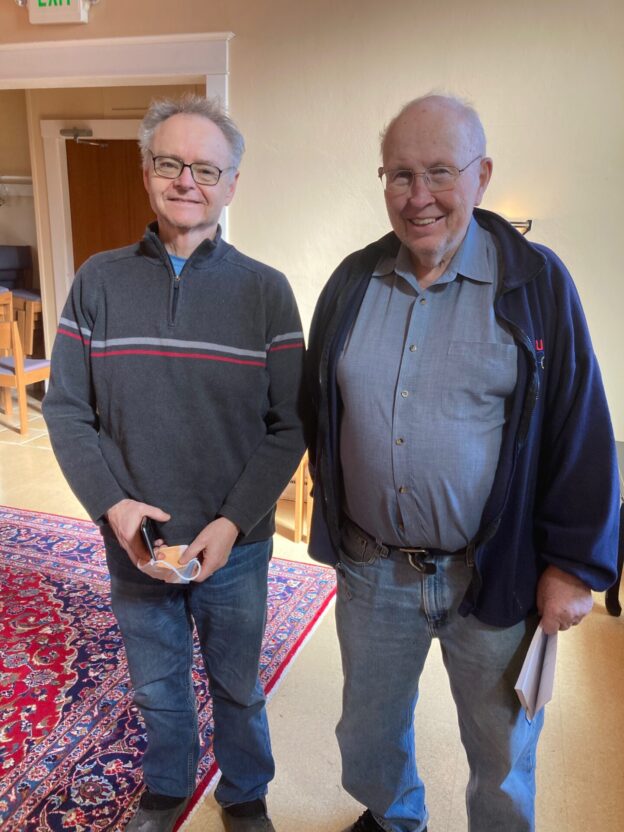
On March 4, 5 & 6, the Subud USA Archives interview project came to Seattle. Two experienced interviewers, Benjamin Boyce and your humble narrator, working closely under the auspices of the SUSA Archives project, interviewed several long-time Subud members about their experience in Subud, how they found out about the organization and what practicing Latihan has meant for their lives. The schedule was packed:
5:00 – Paul Nelson with Benjamin Boyce
10am – Jim and Lucinda O’Halloran with Paul Nelson
11am – Elisha Gullixson with Paul Nelson
12N – Sebastian and Lorraine Tedrow with Paul Nelson
1pm – LUNCH BREAK
2pm – Evan and Annie Padilla with Benjamin Boyce
3pm – Halstein Stralberg with with Benjamin Boyce
4pm – Daniel Stralberg with Benjamin Boyce
5pm – Halimah Bellows with Benjamin Boyce
12N – Danela Mauguin with Paul Nelson
1pm – Sebastian Tedrow and Chuck Cary with Paul Nelson on the founding of Subud Greater Seattle and the acquisition of the Subud House
2pm – Hanafi Libman with Benjamin Boyce
Benjamin and I were at the house at 3pm Friday and got things set up. Benjamin’s equipment is perfect for a job like this, it seems to me, though my expertise is audio. We did an interview with me to use as a test run and it came out good. the interviews are rich and touching and it was a lively weekend which aided our community’s harmony. This is incredibly important as we come out of the pandemic. There were people in attendance who had not been to the Subud House in years. I had a moment of very deep gratitude before the interview with Chuck Cary and Sebastian Tedrow. Chuck talked about the metaphysical community in Seattle and how that community was the seed of how Subud Seattle got started. Back then Vancouver, BC, was part of our region and the first Seattle folks got opened by Ronimund Von Bissing. The Quest Bookstore, a Theosophical bookstore that is still open on Capitol Hill, was part of that 1959 milieu. Sebastian is the man most responsible for acquiring the Subud House in 1974 when he was 25 years old!
I loved most of all my time with Danela Mauguin. Her recall of specific things is remarkable and she was magnificent. On Monday she celebrated 57 years in Subud! Some members needed gentle redirection. The Tedrows required only one question during their interview!
I think having two interviewers is an excellent way to go about these things, so one can get a break. It is an intense experience and requires very high concentration. To aid recall, I have added a question that I did not ask this weekend, about the Subud friends people had/have. This could lead to stories. Since these interviews will not be made available to the general public like some other interviews being done at this time, encouraging interviewees to say anything they want, to be as “woo-woo” as they want, would be something I would encourage.
Spreading out the interviews to allow for some down time is critical. I believe we should tape in the Men’s Latihan hall next time, because the bathroom and a kitchen are connected and the background is unimportant. I think interviews with all members should be encouraged as it could be a time capsule in a way and be a record of where members are, what they are about, at this time.
I want to say that we have been discussing this project for a long time and now that it is here, I am filled with gratitude for this community and awe at how much work the SUSA Archives committee has done to make this happen. I pray that we can continue this in an harmonious way, keeping our eyes on the end game which is creating open spaces where Subud people of all ages can talk about their experiences with this remarkable practice and community. Benjamin got some wonderful photos.
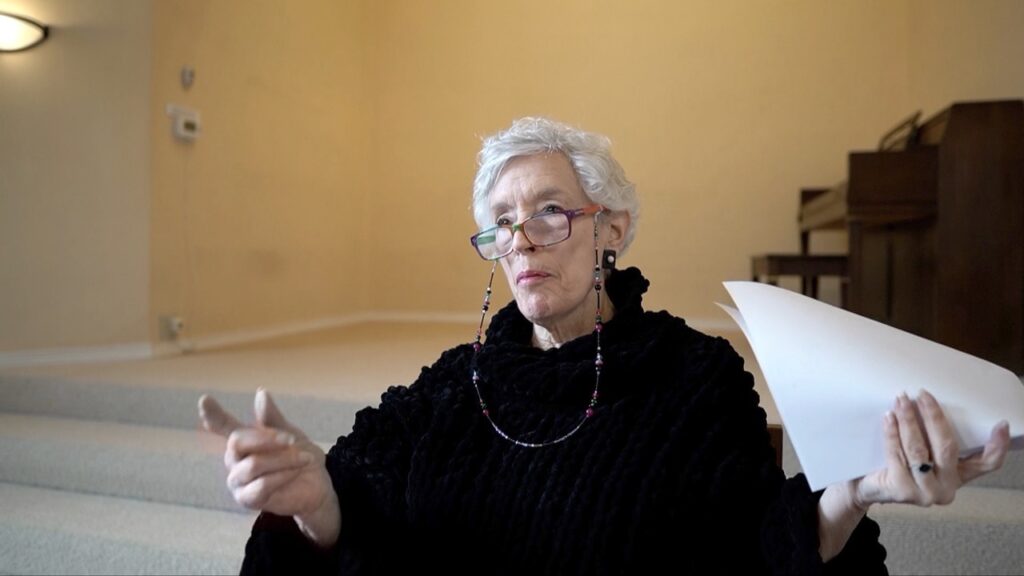
Danela Mauguin
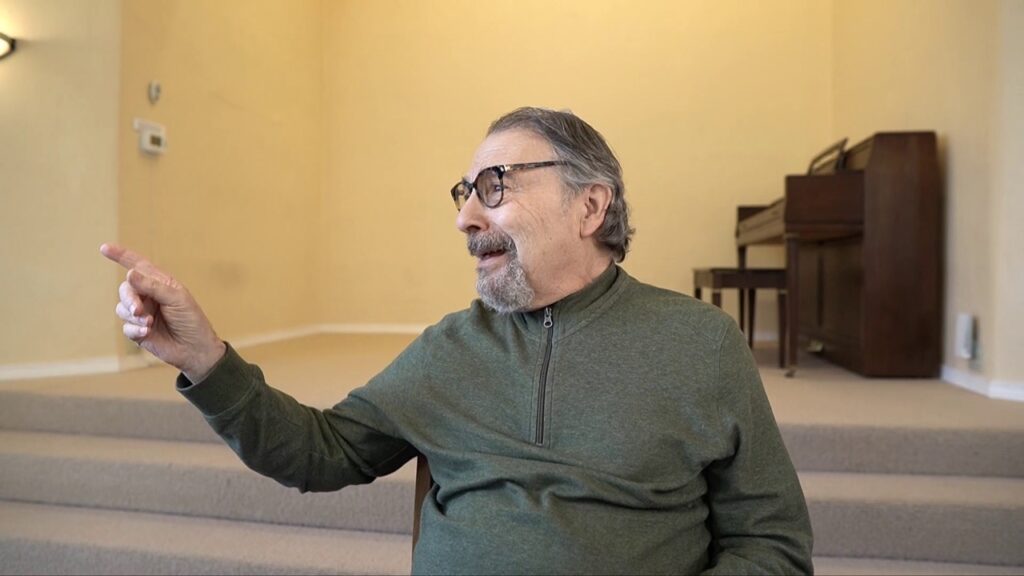
Hanafi Libman
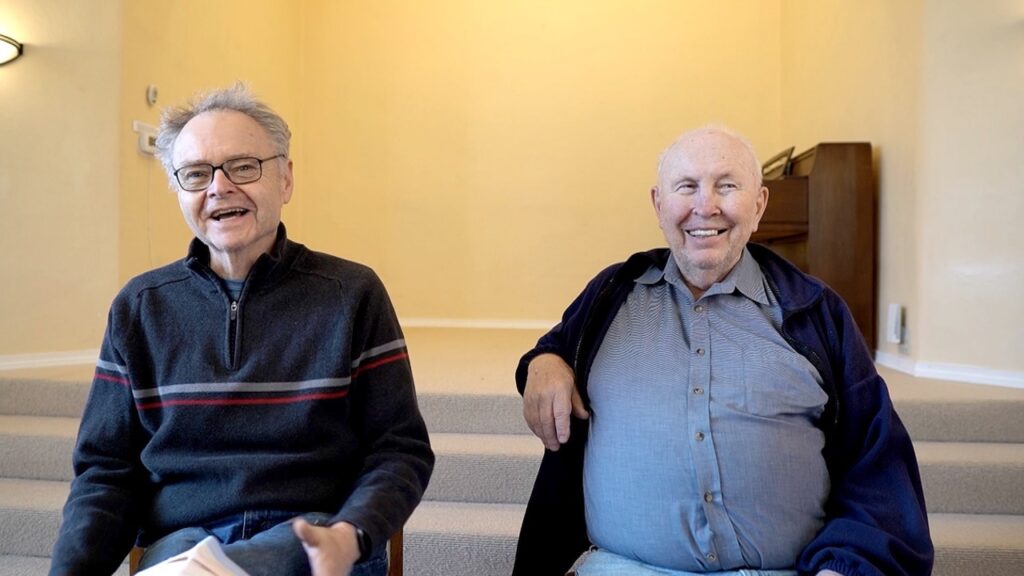
Sebastian Tedrow and Chuck Cary
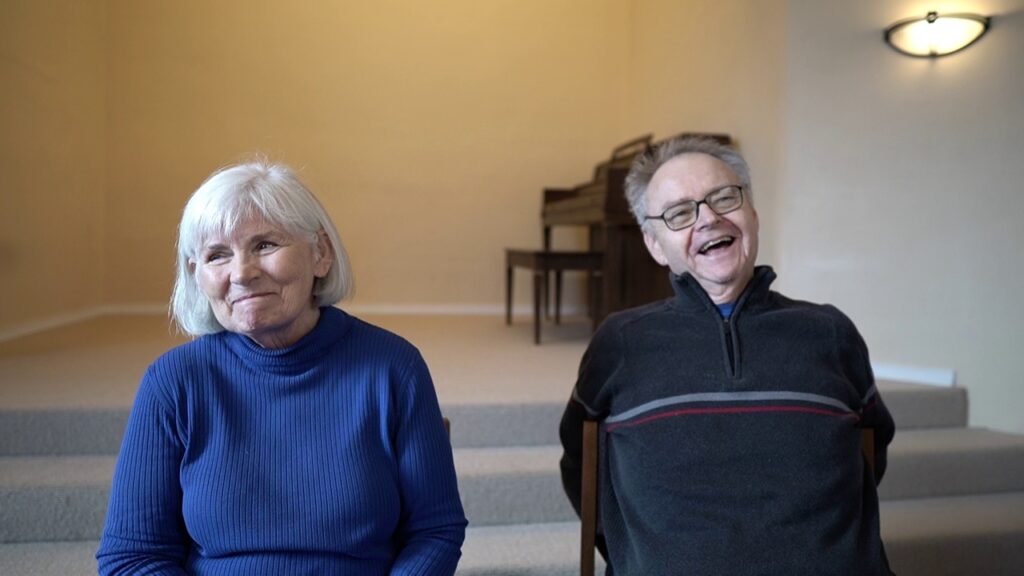
Lorraine and Sebastian Tedrows
Subud USA is helping the SUSA Archives project conduct interviews with long-time Subud members in Seattle, March 4-6, 2022. These interviews are to focus on one’s life in Subud and Subud experiences. Benjamin Boyce and Paul Nelson will be conducting interviews and the schedule is below. All interviews will be conducted in the women’s Latihan hall at the Seattle Subud House.
5:00 – Paul Nelson with Benjamin Boyce
10am – Jim and Lucinda O’Halloran with Paul Nelson
11am – Elisha Gullixson with Paul Nelson
12N – Sebastian and Lorraine Tedrow with Paul Nelson
1pm – LUNCH BREAK
2pm – Evan and Annie Padilla with Benjamin Boyce
3pm – Halstein Stralberg with with Benjamin Boyce
4pm – Daniel Stralberg with Benjamin Boyce
5pm – Halimah Bellows with Benjamin Boyce
12N – Danela Mauguin with Paul Nelson
1pm – Sebastian Tedrow and Chuck Cary with Paul Nelson
2pm – Hanafi Libman with Benjamin Boyce
The archives project is prioritizing older members. We expect there will be future weekends when interviews are conducted for those who were missed the first time. All interviews have been confirmed by the interviewers and the SUSA Archives project, led by Lucas Boladian and Matthew Clark, with the assistance of Laura Paterson.
Ibu Rahayu has asked that these interviews not be made available to the general public, which of course includes posting on Facebook and other social media sites. The SUSA Archives committee is doing everything possible to ensure these interviews are conducted and presented in the best way. Individual members are asked to refrain from conducting interviews without working in concert with the SUSA Archives effort, which has been going on for almost two years and has taken care to address legal, ethical and other issues in the best way possible.
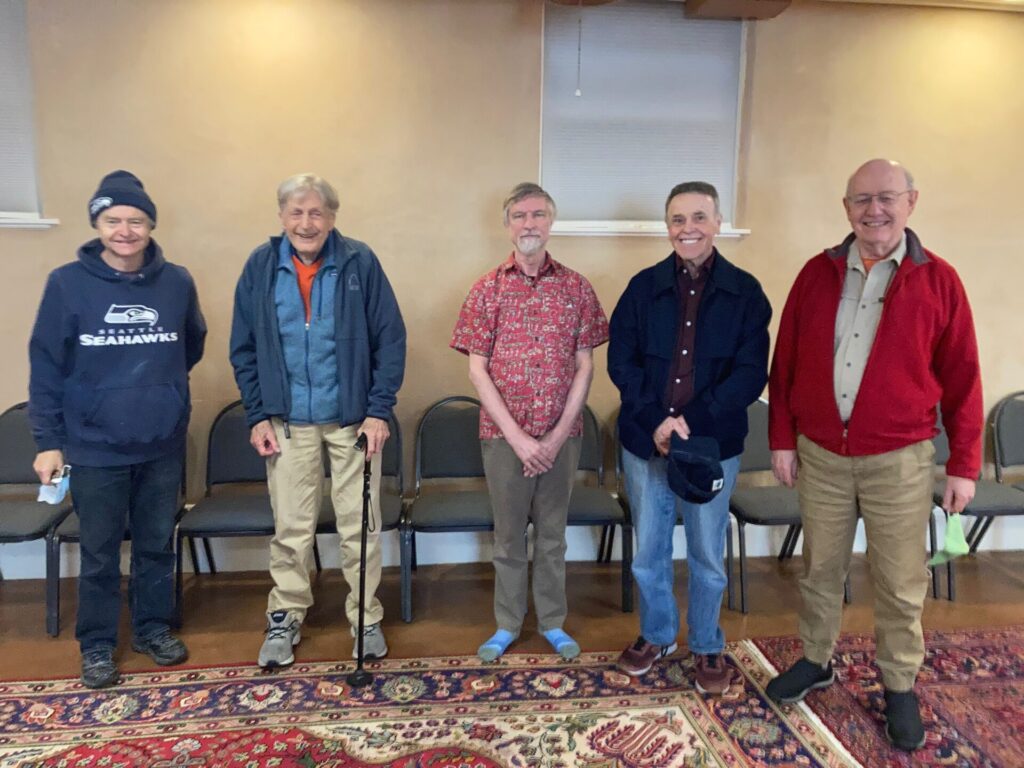
Sebastian Tedrow, Halstein Stralberg, Robert Westmoreland, Evan Padilla and Marston Gregory, May 18, 2021
The pandemic lockdown, now some 440 days in, at least had some good news for Subud Greater Seattle. We had an opening! Please meet Robert Westmoreland, who lives in Everett and was opened Sunday, May 16, 2021, after the regular Latihan. I asked him for a bio and he sent this!
I was born on March 27, 1956, in Gadsden, Alabama. Just before my 7th birthday, my family moved to Louisville, Kentucky, and that is what I consider my “home town”. I was very shy and bookish, and spent most of my time avoiding people (who generally make no sense to me) and reading books. I was raised a Southern Baptist, and at 10 or 11 years old I “made a confession of faith” and was baptized. About a year later, I realized I couldn’t honestly believe the religion I was taught and quit attending church. I have ever since been looking for some spiritual center of gravity for my life, with no real success.
In college, I majored first in Psychology, then switched to Linguistics. In the ’80s, I got a master’s degree in Applied Linguistics at the University of Hawaii, then got a job at the University of Louisville teaching English as a second language, which I did for about 8 years. In 1990, I scandalously married one of my students, a woman from Japan; in 2005, we were divorced. I am embarrassed to say that after 15 years of earnest struggle, I was not able to learn more than rudimentary Japanese.
During the ’90s, I studied at Indiana University for a PhD in Linguistics. Afterwards, for about a year I tried unsuccessfully to get an academic job in Linguistics, and eventually found a position with Microsoft working as a “linguistic tester” for the Office proofing tools. This is what brought me to Washington. While at Microsoft, I taught myself programming, and became a software tester. I worked there for about 14 years. During that time, I met my girlfriend Janet and we have been happily unmarried together ever since. I worked a few years at Starbucks as a software engineer, then about a year at Premera Blue Cross. I lost that job due to the Covid crisis, and decided to throw in the towel and retire. This should work so long as I am careful with my spending, the world economy doesn’t collapse, the government doesn’t up and cancel Social Security, and I don’t live much past 92.
So here I am. I read too much, listen to oddball music, like to cook (but nothing complicated), and volunteer a couple of days a month at a food bank.
Please introduce yourself when you next come to Latihan and welcome this Brother to our community.
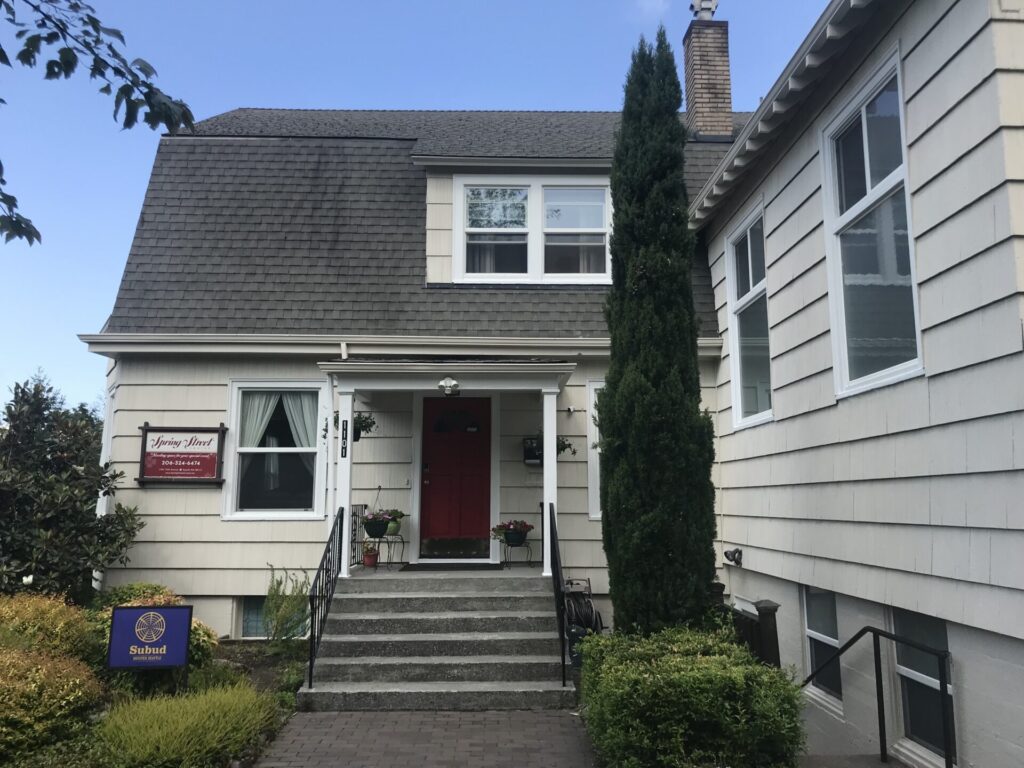
The Helper Dewan met on Sunday, March 21, 2021, and decided that it was now appropriate for 8 women to gather for Latihan at the Subud House and 8 men until further notice. This will be reviewed at the regular third Sunday Helpers meeting in April. Masks are required and each person practicing must sign a release to hold Subud Greater Seattle harmless. Release forms are in the respective halls. Paul Nelson will serve as main helper for the men and Annie Padilla for the women. We will operate under Phase Three Guidelines as issued by the State of Washington.
Members are welcome to attend, are asked to follow CDC guidelines and are encouraged to be two weeks past their final vaccination before practicing in person.
Sunday, March 28 after Latihan there will be a Night of the Ancestors Latihan for those who care to have one. (See this from 2020.)
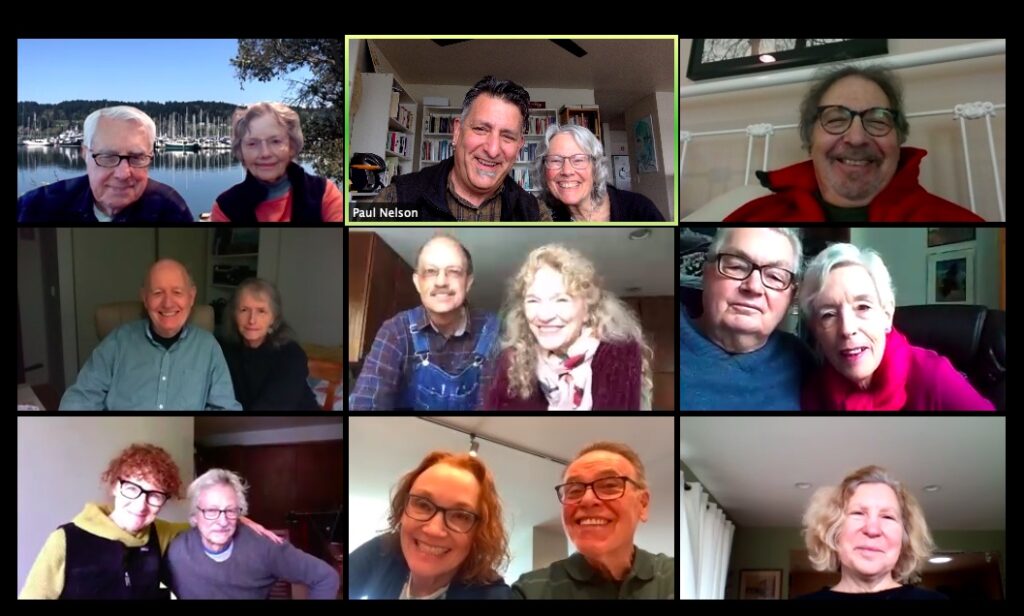 This Sunday the post-Latihan Zoom room will be open and you are invited to share your story about how 2021 is going SO FAR, or just hang out with your Subud Sisters and Brothers. Details:
This Sunday the post-Latihan Zoom room will be open and you are invited to share your story about how 2021 is going SO FAR, or just hang out with your Subud Sisters and Brothers. Details:
SUBUD zoom is inviting you to a scheduled Zoom meeting.Topic: Post Latihan ZoomTime: Jan 10, 2021 11:30 AM Pacific Time (US and Canada)Join Zoom MeetingMeeting ID: 988 202 1449One tap mobile+12532158782,,9882021449# US (Tacoma)+16699006833,,9882021449# US (San Jose)Dial by your location+1 253 215 8782 US (Tacoma)+1 669 900 6833 US (San Jose)+1 346 248 7799 US (Houston)+1 312 626 6799 US (Chicago)+1 929 205 6099 US (New York)+1 301 715 8592 US (Washington D.C)Meeting ID: 988 202 1449Find your local number: https://us02web.zoom.us/u/kdouZ8kIh8
A reminder that this Sunday there will be a resumption of in-person Latihan at the Subud House. Men and Women must enter directly into the Latihan Hall and NOT attempt to go into the house. For details, contact a local helper. Waivers are available in the Men’s Latihan Hall if you have not yet signed one. The Helper on call is responsible for sanitizing the surfaces after Latihan is over. Keep a six foot distance, wear masks at all times and limit each latihan hall to four participants.
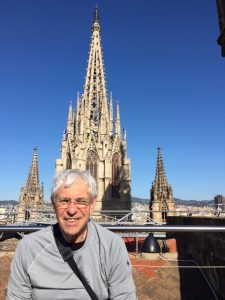
Luther Schutz
From SICA-USA
We’ll celebrate Subud culture on Friday, November 13, 2020, at 7pm PST on Zoom with a virtual rendition of the annual SPNW Kejiwaan event’s culture night. Each performer will take five minutes to give you a taste of their art and those confirmed include:
Susilawati Bryant, Hamilton Cheifetz, Michael Cooke, Elisha Gullixson, Lucas Hille, Michael Koach, David Lynch, Morris McClellan, Jim O’Halloran, Albert Palmeter, Lawrence Pevec, Riantee Rand, Renata Reid and Luther Schutz.
Paul E Nelson is inviting you to a ZooMooka.
Topic: SICA-USA ZooMooka
Time: Nov 13, 2020 07:00 PM Pacific Time (US and Canada)Join Zoom Meeting
https://us02web.zoom.us/j/2064225002Meeting ID: 206 422 5002
One tap mobile
+12532158782,,2064225002# US (Tacoma)
+13462487799,,2064225002# US (Houston)Dial by your location
+1 253 215 8782 US (Tacoma)
+1 346 248 7799 US (Houston)
+1 669 900 9128 US (San Jose)
+1 312 626 6799 US (Chicago)
+1 646 558 8656 US (New York)
+1 301 715 8592 US (Germantown)
Meeting ID: 206 422 5002
Find your local number: https://us02web.zoom.us/u/kd6wmTHvLS
Here is info on some of the performers:
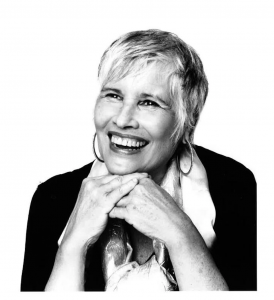
Susilawati Bryant
*Susilawati was born on Kaien Island in The North Pacific, just south of The Alaska Panhandle, in the Canadian province of British Columbia. She was raised in the colonial cities of Prince George, Vancouver, & Kelowna, BC.
“Born Singing!” is a title of one of her albums. When meeting a new human she is often heard saying “Hello! My name is Susilawati & I would rather sing than talk & I would rather swim than walk.” Still true, today. From reverie to the irreverent, & some might say irrelevant, Susila’s writing is significantly influenced by rhythm, rhyme, & the zeitgeist of her times.
Susilawati was Class Poet for her Prince George 1962 Graduation Class, continuing with a UBC Memoir-writing group of five since 2004, & was accepted into SFU’s Editing Certificate Program.
Lucas Hille: Music Bio (the Subud version)
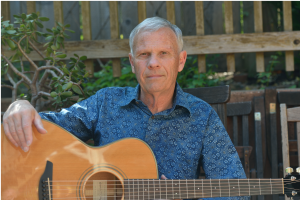 I began singing in the 1960’s, an outcome of my spiritual practice called Subud.
I began singing in the 1960’s, an outcome of my spiritual practice called Subud.
In the early days, I sang in Subud cover bands, one of which was named “The Open Jaw Flight Band.” We had some illustrious gigs in a few Legion Halls in and around Vancouver.
At some point, early on, a few songs came to me, mainly in Country style, because some of the music I enjoyed and played was in that genre. In time, more complex songs began showing up, such as “Little Boys’ Pockets”, aka, “The Child In Me.”
At the time, a reporter who heard me sing “Pockets” at an open mic wrote:
“Lucas isn’t Dylan and he isn’t Lightfoot. He might just be better.” In hindsight, I think her comments both excited and scared me.
In the mid to late 1970’s, a singing Subud brother, Isman Kanafsky, moved to Vancouver, and we formed a band to support the songs he had received. We played mainly at local Subud functions, although we did travel in my Volkswagen Van to San Mateo, ostensibly to play for Bapak, who was giving talks there. Once we had arrived, Isman received that it would not be right for us to play for Bapak, which was disappointing and a bit frustrating, to say the least. This group dis-banded when Isman moved back to the U.S. Isman sparked, for me, an interest in singing and playing from inner guidance, although it would be many years before I would get close to having that experience. Ah, purification….
To follow my dream of being a Country artist, I went to Nashville in the 1990’s and recorded two songs with a label there. This was not a pleasant experience, however, it was a learning one, and I returned to Vancouver more determined to follow music as a spiritual, healing path.
Joining me on this path were Miles Simons on saxophone and Salvador Pedraza on acoustic bass. We released one album, “Destination Peace Of Mind”, from the title of one of Isman’s songs. Sadly, Salvador had to move home to Mexico, and he was replaced by Paul Edwards on Warr Guitar. Our band name was “Spirit Road”, and we played at local coffee houses, churches, one festival and one Subud conference.
In 2016, I recorded and released “Spirit Road”, an EP featuring my daughter, Veda, Kim Brandt on bass and guitar, and Sophia-Ray Schmidt, the daughter of Petrice Brett, reading her amazing poem, “Breathe Out, Breathe In.” This EP was the closest I have come to releasing a fully SICA project: the cover image was an original painting by Aisjah Cassidy, the layout and graphics were by Arifin Graham-an award winning Subud designer, photography by Simone Cherpitel, and, most of the musicians were in Subud. In reviewing this EP, Harris Smart wrote: “This is a collection of original songs with a spiritual resonance. There is definitely a light, peaceful, devotional feeling to these songs.”
I am currently working on a new, 5-song EP with help from my amazing daughter, Veda.
You can find me on: cdbaby.com, Spotify and at www.lucashille.bandcamp.com.
The journey continues…
With love and Spirit,
Lucas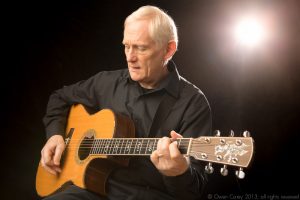
Morris “Mo Mack” McClellan
Morris “Mo Mack” McClellan has been steeped in traditional and roots music. He grew up in a musical family where he was introduced to many forms of folk music, and went on to study the history of Country & Western Music in college. Now, his performances feature old country music, blues, rock & roll, classic folk, contemporary folk, and his own compositions.
About Jim O’Halloran
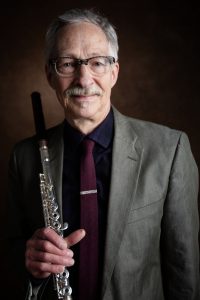 Music means everything to me. I love it because it challenges me to find my center and connection with each note—and the silence between each note— and because it’s a shared experience that impacts each individual differently.
Music means everything to me. I love it because it challenges me to find my center and connection with each note—and the silence between each note— and because it’s a shared experience that impacts each individual differently.
I’ve performed internationally with various ensembles, including leading the Afro-Cuban jazz bands Chela and Freezerburn. My experience over the years has given me not only an extensive list of tunes, but a deep reserve of excellent players to call for specific needs.
I’m currently playing with my own groups, including the Jim O’Halloran Trio, quartet, quintet, and sextets which specialize in jazz, Afro-Cuban, and African music.
When I’m not playing or writing music, I enjoy reading, bicycling, spending time with family, and cardiac electrophysiology (yes, really—I’m an RN-recently retired). I also love going on walks near our home in Seattle with Lyle, the best dog in the world.
Jim O’Halloran, Flute
Jim graduated Magna Cum Laude from Eastern Washington University. He did post graduate study with Felix Skowronek and attended master classes with Julius Baker and James Galway. Jim has played internationally based out of Seattle since the late 1970’s. He was the leader and composer for afro-cuban jazz bands Chela and Freezerburn. Jim has played with Orquestra Yerbabuena, Mambo Cadillac, Expresión Latina, Global Village, Orquesta Ilusion, Latin Dimension, Orchestra Zarabanda, the Deano’s House Band, Michael Nicolella, Bochinche, and Charanga Danzon. Jim is currently playing with his own group, the Jim O’Halloran Trio and Quintet including top Seattle players D’Vonne Lewis, Royce Shorter, Jr., Jacques Willis, Marina Albero, Bill Anschell, Dean Schmidt, Farko Dosumov, Osama Afifi, Ben Verdier, Ricardo Guity, Lance Lu, and Denny Stern.
Jim’s music is available on Spotify, Amazon, and iTunes.
Riantee Rand
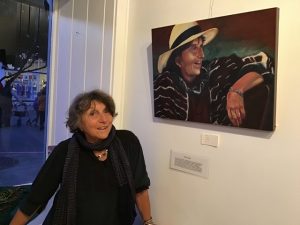 Riantee Rand was born in Paris, France, where her first book of French poetry was published. After traveling around the world she moved to the Mendocino Coast with her husband and 3 children in 1973. She participated in poetry readings, radio shows and contributed to reviews, magazines and anthologies with her poetry, articles and short stories all over the country. She has been a translator of French Poetry and Art Essays. Two books of her poetry, one of non-fiction, one of travel stories and a fictionalized memoir are in print as well as her first book for children.
Riantee Rand was born in Paris, France, where her first book of French poetry was published. After traveling around the world she moved to the Mendocino Coast with her husband and 3 children in 1973. She participated in poetry readings, radio shows and contributed to reviews, magazines and anthologies with her poetry, articles and short stories all over the country. She has been a translator of French Poetry and Art Essays. Two books of her poetry, one of non-fiction, one of travel stories and a fictionalized memoir are in print as well as her first book for children.
Renata Reid
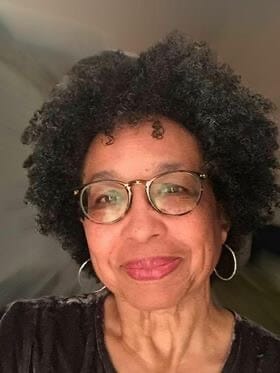 Renata Reid is an acupuncturist, a silk painter, designer, and writer of poems. She divides her time unevenly between these avocations to alternately satisfy her muse and the need for food, shelter, and a lifelong addiction to fine art supplies and visiting distinctly soulful places. You can find her on social media or by googling the first two words of this bio, especially when combined with the words, “Alison” and “Bretell” or “silkpoetry.”
Renata Reid is an acupuncturist, a silk painter, designer, and writer of poems. She divides her time unevenly between these avocations to alternately satisfy her muse and the need for food, shelter, and a lifelong addiction to fine art supplies and visiting distinctly soulful places. You can find her on social media or by googling the first two words of this bio, especially when combined with the words, “Alison” and “Bretell” or “silkpoetry.”
Luther Schutz bio
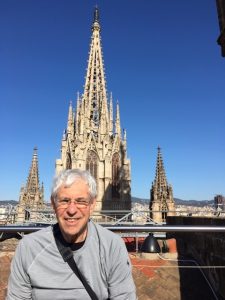
Luther Schutz
I grew up in NYC in a musical family, the son of Juilliard graduates. My father worked on Broadway musicals and I remember spending a lot of time backstage over the years.
Leaving NYC for California and medical school at age 21, I became part of the Bay Area folk music scene.
In the ensuing years I have been a singer-songwriter, a member of several bands and vocal ensembles, including Inner Voices, Midlife Crisis, and Equinox. Lately I have been singing jazz standards and exploring the Great American Songbook with my dear friend and brother Elisha Gullixson.
I have lived in rural northwest Washington for the last 43 years with Maryam, my wife of 50 years. I retired in 2010 after a 33 year career as an ER doctor. We have four children and eight grandsons!